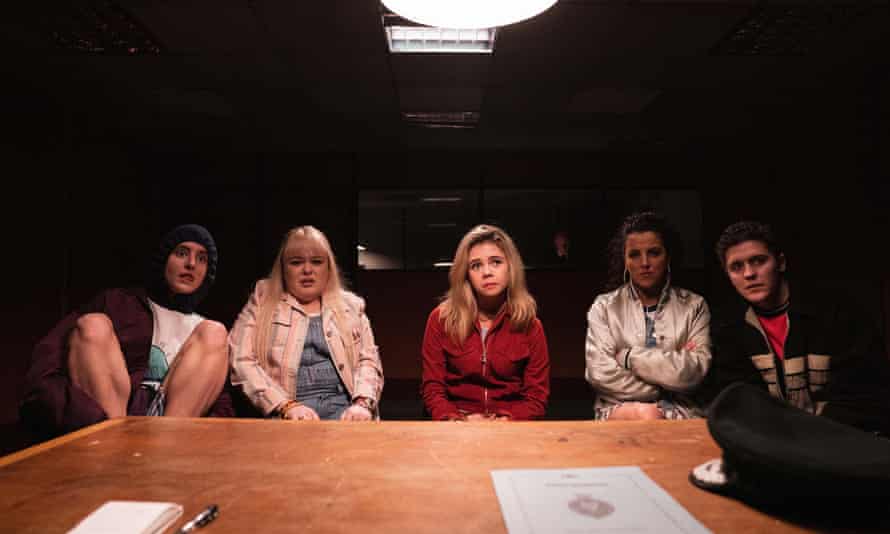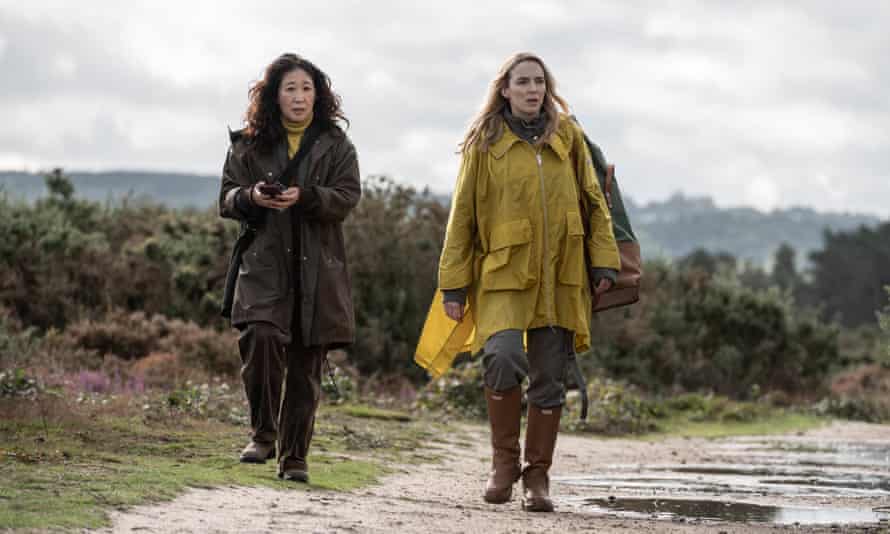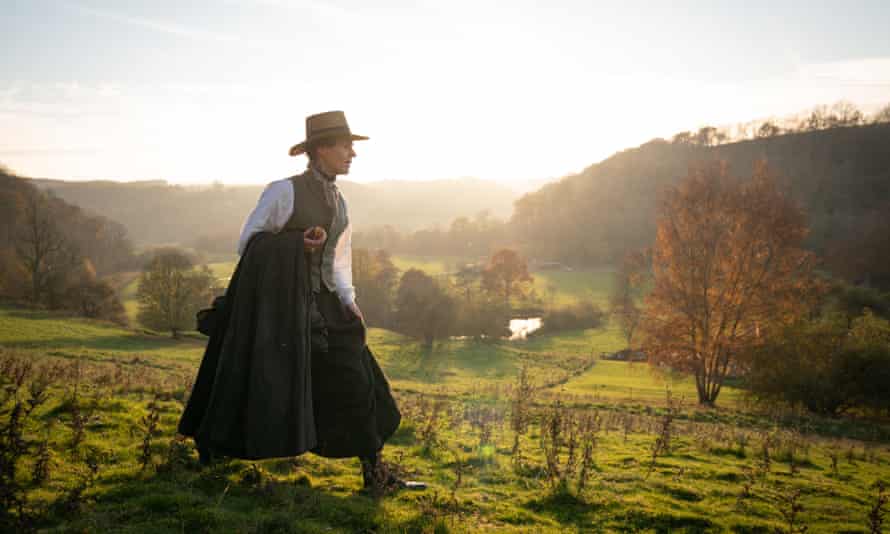
The week in TV: Anatomy of a Scandal; Derry Girls; Killing Eve; Gentleman Jack | Television
Anatomy of a Scandal | Netflix
Derry Girls (Channel 4) | All 4
Killing Eve (BBC One) | iPlayer
Gentleman Jack (BBC One) | iPlayer
In a week in which yet another Tory MP is in the news over sexual assault allegations (that’s four in the past couple of years, by my count), Netflix’s much-hyped political thriller Anatomy of a Scandal debuts. It’s the latest drama to mix the high-stakes environments of law and politics while also throwing in some pretty fundamental questions on consent and class, social and sexual capital. It’s fiction – but you don’t have to look far beyond SW1 for myriad sources of inspiration.
Adapted from Sarah Vaughan’s 2018 novel, it has pedigree names behind the camera, including former House of Cards showrunner Melissa James Gibson and David E Kelley, a writer I’ve loved since spending my teenage years watching box sets of Ally McBeal. This time, the action in the courtroom is much, much darker.
Rupert Friend (Homeland) plays James Whitehouse, a government minister and best friend of the prime minister (Geoffrey Streatfeild, last seen playing an altogether different type of politician in The Thick of It). James has two kids with his beautiful wife, Sophie (Sienna Miller), who, we learn from flashbacks, he met when both were students at Oxford. We’re also jolted back in time to when James and the PM were both members of the university’s exclusive, raucous, restaurant-destroying posh boys club. Sound familiar?
Unfortunately for James, this privileged life, which is all he’s ever known – “Whitehouses always come out on top!” is something he likes to chant with his children – is severely threatened when an affair with his parliamentary assistant is splashed across the front page of the Daily Mail. Soon, events take an even more serious turn. Enter Michelle Dockery’s bespectacled and bewigged prosecution QC sweeping bat-like through chambers.
Miller – who I have liked since she was a) brilliant as Edie Sedgwick in Factory Girl, and b) forced to apologise for calling Pittsburgh “Shitsburgh” – is perfectly cast as a woman trying to make her way through the most paparazzi cameras seen outside a courthouse since Johnny Depp’s libel trial. But you get the sense that there’s a lot more to Sophie than her Le Creuset collection. Meanwhile, Friend’s eyebrows put in a typically talented performance, and they’re telling us their owner is not to be trusted.
On the subject of significantly expressive facial features, Saoirse-Monica Jackson’s ability to rearrange hers as though she were doing a Rubik’s Cube is just one of the reasons Derry Girls has been the funniest show on television in the past few years. Inspired by creator Lisa McGee’s real-life teendom, when she attended a Catholic school in Northern Ireland during the Troubles, while also indulging in the very best of mid-90s pop culture, it has proved dramatically and comedically to be quite the combination.

This third and final series opens with Erin, Clare, Orla, Michelle and, of course, cousin James, the Wee English Fella, awaiting their GCSE results and keeping busy by making a home video documentary that may or may not be in with an Oscars shout – if only aspiring writer Erin can brush up the script. Perhaps she should solicit advice from McGee, whose writing remains sublime. Nicola Coughlan’s perma-anxious Clare, worried about being led astray and failing her exams, says to Erin: “I was a scholar when I met you!” Erin: “You were three.”
Expect big-name guest stars, thrilled to be a part of a show that has proved to be a masterpiece of pathos, humour and double denim. Oh, and please, for the love of Jesus, listen out for the revelation of Sister Michael’s full name.
Also bowing out is Killing Eve, which burst on to our screens four years ago, after the kind of breathless buildup befitting a show about a Russian assassin on the run from the intelligence services. It was stylistically bold, sharp as a murder weapon (take your pick) and sizzled with the chemistry between then up-and-coming Jodie Comer as Villanelle and Sandra Oh as Eve Polastri.
It’s perhaps because Phoebe Waller-Bridge, the writer of series one (who has remained an executive producer throughout), set the bar so high that some measure of disappointment inevitably followed. While maintaining flashes of brilliance and the darkly comic set pieces that are the show’s forte, series two and three felt uneven because of the changing roster of head writers.

This final fourth series sees the net closing in on the Twelve, the shady syndicate responsible for more spilt blood than an arterial haemorrhage. Covid filming restrictions have given the whole series a more low-key feel: fuchsia tulle dresses and Venetian apartments out, yellow anoraks and mountain bothies in. But emotionally, everything in this grand finale is full throttle. And there hasn’t been a television snog so desperately anticipated as the one between Eve and Villanelle since Tim and Dawn locked lips in The Office. A lot happens. A lot happens. People are already moaning about it on the internet.
Speaking of desperate anticipation, I may be hankering for the third series of the brilliant Sally Wainwright’s Happy Valley (it’s been six years!), but in the meantime I’ll settle for the rollicking 19th-century escapades of Anne Lister in Gentleman Jack. Fresh from unveiling a Halifax statue of the eponymous character, Suranne Jones is back in her dapper waistcoat, only to take it off whenever steaming up mahogany bedrooms.

Series two begins with Anne’s paramour, er, Ann (speaking from experience, dual names are an unfortunate same-sex couple hazard), having moved into Shibden Hall after their makeshift nuptials. This bodes well for a more settled love life for our favourite fourth-wall-breaking diarist – but as Eve and Villanelle can attest, the course of true love never did run smooth.
What else I’m watching…
Julia
(Sky Atlantic/Now TV)
Sarah Lancashire plays the American chef and author Julia Child, who transfixed the US in the 1960s with her pioneering TV cookery show The French Chef, in this new eight-part HBI drama. Child is much less well known in the UK, but Lancashire is as watchable as ever, and steers away from what could have been a kitsch performance played for laughs.
Thatcher & Reagan: A Very Special Relationship
(BBC Two)
Following on from a clutch of successful Beeb political documentaries (Blair & Brown: The New Labour Revolution is still available on iPlayer) Charles Moore, former Telegraph and Spectator editor, presents this one. It’s all a bit of a love-in, but worth watching for insight from the likes of Malcolm Rifkind and Bernard Ingham, and, of course, Moore himself.
Worlds Collide
(ITV)
This documentary on the Manchester Arena bombing is a harrowing watch, even more so when it digs down into the things that might have prevented the moment Salman Abedi killed 22 people at an Ariana Grande concert in 2017.
